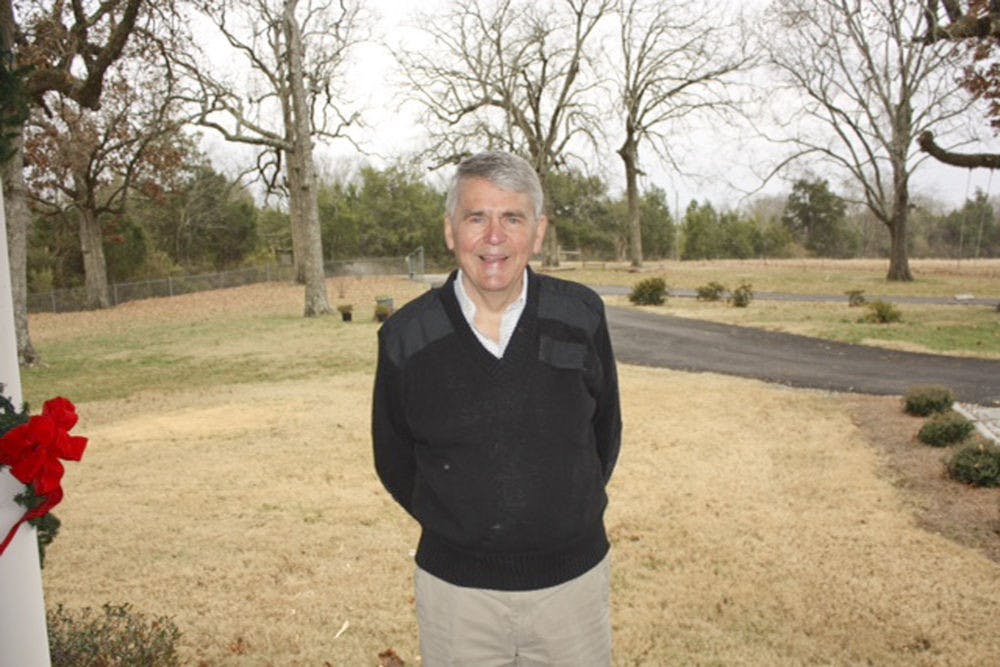In Thomas Oakland’s former office at 1403 Norman Hall, the walls were covered in awards.
He sat among accolades from the University of Florida, the International School Psychology Association, American Psychological Association — almost every award in the school psychology field.
But among the awards was a single framed “thank you” note. Written by the cleaning lady, it carried the same prestige for Oakland as every other plaque on the wall.
“It just told you he was equally as concerned with reaching people as getting awards,” his son, David, 47, said. “And it didn’t matter who the people were. From least to greatest, he saw everyone equally.”
It was this desire to connect with people that gave him life, and ultimately gave him death.
On March 4, roughly five years after his retirement from UF, Oakland was reportedly killed in his Gainesville home by a man he had given more than $37,000.
After Oakland learned the day laborer, Stephen Underwood, Jr., 38, had swindled him out of some of the money, he requested Underwood be trespassed from his property in February, according to police.
Then, over Spring Break, Underwood reportedly broke into Oakland’s house, knocked him unconscious and set his house on fire.
He was 75.
***
Born Nov. 23, 1939, in Kenosha, Wisconsin, Oakland spent his childhood playing in the waters of Lake Michigan and watching the Chicago Cubs. He served as class president twice in high school before he went on to study at Lawrence University.
He found his passion in school psychology — assessing the educational capabilities of children and adults.
“He was an educator at heart,” said Jean Crockett, a director in UF’s College of Education, who worked with Oakland for a year before his retirement.
As a school psychologist, Oakland authored or edited 12 books, more than 200 chapters and 11 psychological tests, including one to determine mental disability in death row inmates.
“Talking to him, you knew you were to talking to a very brilliant man,” Crockett said. “But you also knew you were talking to a very kind man.”
Oakland brought his research across the country, teaching at the University of Texas at Austin for 27 years before coming to UF. A 1988 Fulbright Scholar, he also taught across the globe in New Zealand, Macau and other international universities.
“He loved to travel and he loved his profession,” David said.
But Oakland always returned to his children and grandchildren. A divorced father, he made sure he was always there for a board game or a baseball game with the neighborhood kids.
“Isn’t life joyful and abundant?” his son, Chris, 45, said at the service. “That’s how Dad lived.”
***
Oakland often spoke of two life goals: to be a good father and a competent professional.
At a celebration of his life Saturday at Trinity Methodist Church, it was clear he had succeeded at both.
“It’s just an honor to stand in front of the people my dad loved,” David said to his father’s colleagues and students, his voice breaking. “He loved each of you dearly. Even though I don’t know you well, you’re in my heart because you’re in my dad’s heart.”
More than 100 people came to celebrate Oakland, traveling across the country and the world for their friend and mentor. Two students flew in the night before from Hong Kong to pay their respects to “Papa Tom.”
“Essentially every job I’ve applied for, every professional move I’ve made, I touched base with him about it,” Tara Raines, 34, said. “I feel like I owe my entire professional career to him.”
Raines, a psychology professor at the University of Nevada, first met Oakland in a Costa Rica immersion program 11 years ago. She said he inspired her to pursue her doctorate and start her own program.
“He was gentle, humble, so thoughtful,” she said. “His only interest was my best interest.”
***
In life and in death, Oakland was organized.
He left his sons what they called “the death file” — the psalms to be sung, the verses to be read and the obituary to be published.
Chris edited the obituary to add a more personal touch, but being so used to his father editing his work, he almost sent Oakland an email with the revised version.
“He had a desire to be precise and accurate and thorough,” David said, noting his father was also known for his eloquence.
Oakland, however, would still greet people, friends and strangers alike, with “Hey, chum.”
“It was kind of symbolic of how friendly and warm he was with everybody,” David said.
***
After the police investigation concludes, Oakland will return to Kenosha one last time.
His body will be cremated there during the summer after a second service.
His remains will be buried next to his parents, his sister and other family members.
Regardless of the circumstances, his family said Oakland was never afraid of death. It was an answer to the question he often posed: So how would you write your next chapter?
“He knew he would be going on to another chapter filled with people he loved,” Chris said at the service. “He’ll be there to greet us.”
As Crockett remembered her late colleague, she pondered what she called “a real Tom Oakland question.”
“Well,” she said. “I better go write my next chapter.”
[A version of this story ran on page 1 - 4 on 3/30/2015 under the headline “”]
Thomas Oakland, a retired UF professor, poses for a family photo. He was killed March 4, 2015.






